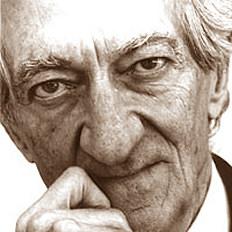This week Italy mourns the poet that Rai called its “last Marxist”, Edoardo Sanguineti, who died in hospital in Genoa on Tuesday. Sanguineti – poet, playwright, Dante expert, essayist and politician – was also a noted translator of Joyce, Molière, Shakespeare and Brecht.
Born in Genoa in 1930, as a child Sanguineti was misdiagnosed with a serious heart condition. When the error was discovered he had to spend a lot of time exercising to restore muscle tone. His family moved to Turin when Edoardo was four and there he was influenced by his uncle, the musician Luigi Cocchi. Another influence was his cousin Angelo Cervetto who introduced him to jazz. Thus the foundations for the deconstruction and reconstruction of language were laid.
At the Liceo Classico D’Azeglio Edoardo’s Italian teacher was influential and it was to this teacher that he first read his poems. Edoardo’s mother died in 1953 and in the same year he met his future wife, Luciana. They married in 1954 and had three children.
Graduating in 1956, Sanguineti published his first poetry collection , “Laborintus” in 1956. In 1963 he founded the “Gruppo 63” a neoavanguardia movement that revolutionised the Italian literary scene. Sanguineti used, and continued to use, playful language and wordplay to reflect the chaos of the times. This technique has been referred to as the “dissolution” of daily language by Italian critics. Much of his work has been set to music by Luciano Berio.
Sanguineti became Professor of Literature at the Universities of Turin, Genoa and Salerno and in 1979 he became a deputato [Member of Parliament] as an independent on the PCI [Italian Communist Party] list. It was during this period that he met Italy’s current President, Giorgio Napolitano, who paid tribute to him this week. In 1996 Edoardo Sanguineti became a Cavaliere di Gran Croce dell’Ordine di gran merito della Repubblica Italiana [Knight, Grand Cross].
Asked in an interview why students prefer Dante’s “Inferno” to the “Purgatorio” or “Paradiso” Sanguineti said,
“…l’inferno è la terra. E un inferno globalizzato”. [“… hell is the earth. It’s a globalised inferno.”]
Sanguineti’s view of the world was a pessimistic one but he did believe in the redeeming quality of human love. He believed that the poet’s role is, in part, to explain the world and of poetry he said,
“La poesia non è una cosa morta ma vive una vita clandestina”. [“Poetry is not dead but it lives a secret life.”]
In tributes Culture Minister Sandro Bondi said that Sanguineti had been “a fundamental voice of Italian literature in the second half of the twentieth century” and his publishers, Feltrinelli, said that he had represented “a conscience of our time”.
Edoardo Sanguineti, 9.12.1930 – 18.5.2010
Have you read any Dante?
Do you agree with Sanguineti’s idea that “the earth is a globalised hell”?









